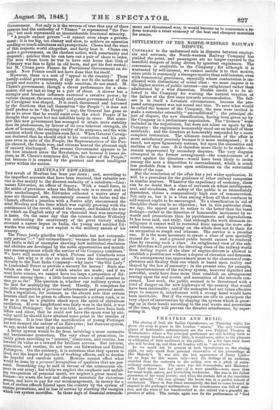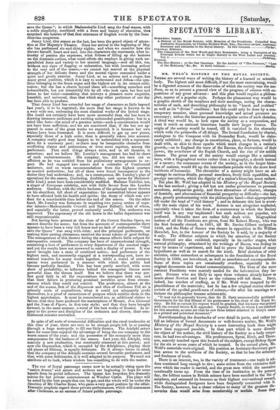THEATRES AND MUSIC.
The closing of both the Italian Operahouses, on Thursday night, has given the coup de grace to the London "season.' The only remaining places of fashionable entertainment are the two Political Theatres at Westminster; where a few principal performers are still holding forth to almost empty benches, and very little, it would seem, either to the pleasure or edification of their audiences or the public. In a few days their doors also will be shut up, and then all London will be "out of town." As we could not be present at both Operahouses on the closing night, we only speak from personal observation of the proceedings at Her Majesty's. It was also the last appearance of Jenny Lind— let us hope for this season only—and the feelings of an audience, crowded from the orchestra to the ceiling, rose to a pitch of extra- ordinary enthusiasm. The opera was the Sonnambula; and Mademoi- selle Lind threw into her part—if it were possible—even more than her usual truth, nature, and bewitching tenderness. She was in the fullest possession of her vocal powers; and when the curtain fell at the repetition of her splendid "Au, non giunge," the house was in a perfect tumult of excitement. Three or four times successively she had to come forward to respond to the prolonged acclamations: her countenance was full of emo- tion, and the wave of her handkerchief as she retired was a graceful ex- pression of adieu. The curtain again rose for the performance of "God
stave the Queen"; in which Mademoiselle Lind sang the final stanza, with a noble simplicity, combined with a force and beauty of elocution, that surprised the hearers of that first utterance of English words by the Scan dinavian songstress.
Jenny Lind, this season as the last, has been the grand object of attrac- tion at Her Majesty's Theatre. Since her arrival in the beginning of May she has performed six-and-thirty nights; and when we consider how she throws herself, heart and soul, into the characters she represents, what in- tensity of passion she expresses, what fulness of filling up she bestows on the dramatic outline, what vocal efforts she employs in giving such un- paralleled force and variety to her musical language,—and all this, too, without any signs of flagging or exhaustion, but with increasing ardour to the very end of the Beasom—we cannot but marvel at the physical strength of her delicate frame and the mental vigour concealed under a quiet and gentle exterior. Jenny Lind, as an actress and a singer, has many great qualities, which it is easy to understand and define—the qua- lities belonging to the finest organ and the highest art in its utmost culti- vation; but she has a charm beyond them all—something nameless and indescribable, but yet irresistibly felt by all who look upon her face and listen to her voice—something that conveys a pleasure more exquisite, heartfelt, and universal, than that which any other performer of our day has been able to produce.
That Jenny Lind has extended her range of characters so little beyond last year's is to be regretted; the more that her range is known to be a very wide one, embracing the most classical works of the lyrical stage. She could not certainly have been more successful than she has been in drawing immense audiences and exciting unbounded gratification: but to a mind like hers—the mind of a genuine artist—such a consideration would not have been sufficient; and we are convinced that, if she has not ap- peared in some of the great works we expected, it is because her own wishes have been frustrated. It is more difficult to get up new pieces, especially those of a high order, than is generally taken into account. A company really good may happen to be unfurnished with a represent- ative for a necessary part; or there may be insuperable obstacles from conflicting claims and pretensions, or even mere caprices, among the performers. That such things always exist, and in all theatres, is notorious; and we believe Mr. Lumley's management has had its share of such embarrassments. His company, too, did not turn out so efficient as he was entitled from his preliminary arrangements to ex- pect. He had engaged two tenors and a contralto of Continental eminence, and on warm recommendations from the highest quarters as musical authorities; but all of them were found incompetent to the duties they had undertaken; and, as a consequence, Mr. Lumley's plan of operations for the season (including, doubtless, new operas for Mademoi- selle Lind,) must have been considerably modified. Madame Tadolini, too, 8. singer of European celebrity, met with little favour from the London audience. Gardoni, with the whole business of the principal tenor thrown on his shoulders, fell short of expectation: his unremitted labour appears to have affected both his health and spirits; the decay of which was evi- dent for a considerable time before the end of the season. On the other hand, Mr. Lumley was fortunate in acquiring two young artists of supe- rior talents—Mademoiselle Cruvelli and Signor Belletti; both of whom, and especially the latter, proved eminently useful. The orchestra was improved. The supremacy of the old house in the ballet department was still unquestionable.
Not having been present at the close of' the Covent Garden Opera, we cannot describe the scene; but from the accounts of contemporaries there appears to have been a very full house and no lack of enthusiasm. "God save the Queen" was sang with eclat; and the principal performers, on making their parting obeisances, received the usual tokens of good feeling. The management of this theatre during the season affords little subject for retrospective remark. The company has been of unprecedented strength, containing a host of performers in every department of the musical stage: and yet the results have not answered to such a display of power. It was never brought into a state of combined action; and performers of the highest rank, and necessarily engaged at a corresponding cost, have re- mained inactive for many weeks together, while a round of common operas were performed in a manner with which the public had become perfectly familiar. This has been partly ascribed, with some show of probability, to influence behind the managerial throne more powerful than the throne itself. But we believe that there was per- fect good faith in all the expectations the managers held out, and that their failure in producing promised novelties arose from circum- stances which they could not control. The production, almost at the end of the season, first of the Huguenots and then of Guillaume Tell, on a princely scale of expenditure, when it could not adequately profit themselves, is a proof of earnestness of purpose which entitles them to the highest approbation. It must be remembered too, as additional claims to favour, that they have produced the masterpieces of Mozart, Don Giovanni and the Nome di Figaro, in first-rate style; and that they have brought forward, in the same manner, saveral of the best works of Rossini. In re- spect to the power and discipline of the orchestra and chorus, their esta- blishment remains unrivalled.



























 Previous page
Previous page